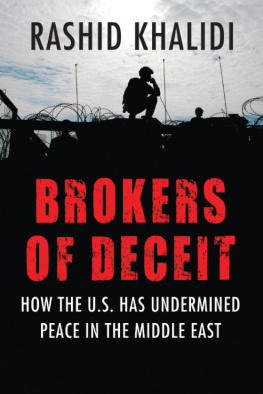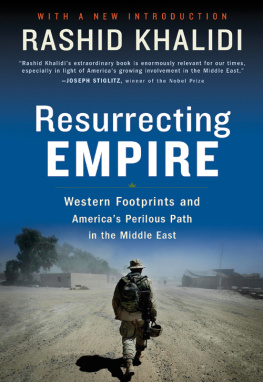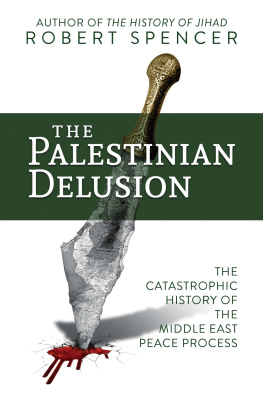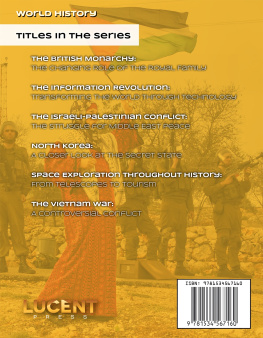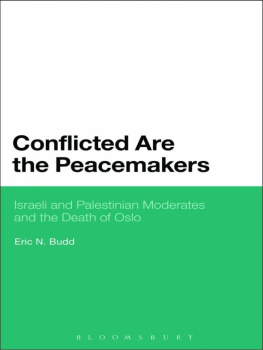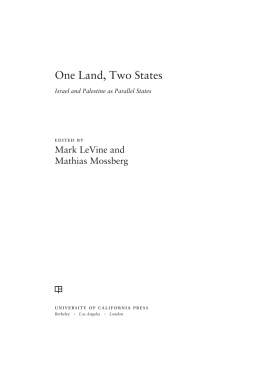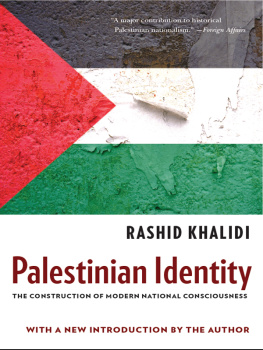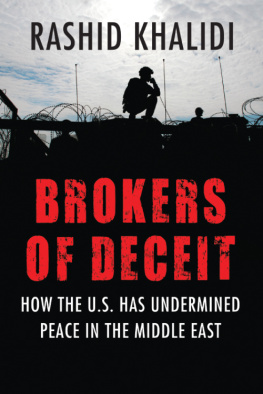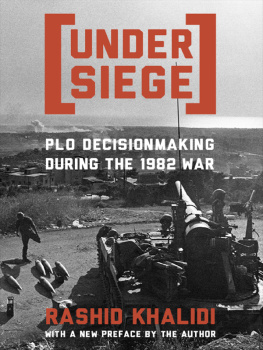ALSO BY RASHID KHALIDI
British Policy towards Syria and Palestine, 19061914
Palestine and the Gulf (coeditor)
Under Siege: P.L.O. Decisionmaking During the 1982 War
The Origins of Arab Nationalism (coeditor)
Palestinian Identity: The Construction of Modern National Consciousness
Resurrecting Empire: Western Footprints and Americas Perilous Path in the Middle East
The Iron Cage: The Story of Palestinian Struggle for Statehood
Sowing Crisis: The Cold War and American Dominance in the Middle East

TO DR. HAYDAR, FAYSAL, IQBAL,
EDWARD, AND IBRAHIM,
ALL OF WHOM FORESAW THE PITFALLS AHEAD.
INTRODUCTION
DISHONEST BROKERS

The slovenliness of our language makes it easier for us to have foolish thoughts. If thought corrupts language, language can also corrupt thought. A bad usage can spread by tradition and imitation, even among people who should and do know better.
GEORGE ORWELL, POLITICS AND THE ENGLISH LANGUAGE, 1946
In politics and in diplomacy, as in much else, language matters greatly. However debased political discourse may become, however disingenuous diplomacy often is, the words employed by politicians and diplomats define situations and determine outcomes. In recent history, few semantic battles over terminology have been as intensely fought out as those concerning Palestine/Israel.
The importance of the precise use of language can be illustrated by the powerful valence in the Middle East context of terms such as terrorism, security, self-determination, autonomy, honest broker, and peace process. Each of these terms has set conditions not only for perceptions, but also for possibilities. Moreover, these terms have come to take on a specific meaning, frequently one that is heavily loaded in favor of one side, and is far removed from what logic or balance would seem to dictate. Thus in the American/Israeli official lexicon, terrorism in the Middle East context has come to apply exclusively to the actions of Arab militants, whether those of the Palestine Liberation Organization (PLO), Hamas, Hizballah, or others. Under these peculiar terminological rules, the actions of the militaries of Israel and the United States cannot be described as terrorism, irrespective of how many Palestinians, Lebanese, Iraqi, or Afghan civilians may have died at their hands.
Similarly, in this lexicon, security is an absolute priority of Israels, the need for which is invariably described as rooted in genuine, deep-seated existential fears. Israeli security therefore takes precedence over virtually everything else, including international law and the human rights of others. It is an endlessly expansive concept that includes a remarkable multitude of things, such as whether pasta or generator parts can be brought into the Gaza Strip, or whether miserably poor Palestinian villagers can be allowed water cisterns. By contrast, in spite of the precarious nature of their situation, Palestinians are presumed not to have any significant concerns about their security. This is the case even though nearly half the Palestinian population have lived for more than two generations under a grinding military occupation without the most basic human, civil, or political rights, and the rest have for many decades been dispersed from their ancestral homeland, many of them living under harsh, authoritarian Arab governments.
This book is concerned primarily, however, not with the misuse of language, important though that is, but with an American-brokered political process that for more than thirty-five years has reinforced the subjugation of the Palestinian people, provided Israel and the United States with a variety of advantages, and made considerably more unlikely the prospects of a just and lasting settlement of the conflict between Israel and the Arabs. This is the true nature of this process. Were this glaring reality apparent to all, there might have been pressure for change. But the distortion of language has made a crucially important contribution to these outcomes, by corrupting thought, and thereby cloaking their real nature. As we shall see in the pages that follow, language employed in the Middle East political contextterms like terrorism and security and the others mentioned abovehas often been distorted and then successfully employed to conceal what was actually happening.
Where the Palestinians are concerned, time and again during their modern history, corrupted phraseology has profoundly obscured reality. The Zionist movement decisively established a discursive hegemony early on in the conflict with the Palestinians, thereby significantly reinforcing the existing power balance in its favor, and later in favor of the state of Israel. This has placed the Palestinians at a lasting disadvantage, as they have consistently been forced to compete within a field whose terms are largely defined by their opponents. Consider such potent canards as making the desert bloomimplying that the six hundred thousand industrious Palestinian peasants and townspeople who inhabited their homeland in the centuries before the relatively recent arrival of modern political Zionism were desert nomads and wastrelsand a land without a people for a people without a land, which presumes the nonexistence of an entire people.
In this book I attempt to pierce one aspect of a carefully constructed realm of obscurity, a realm in which the misuse of language has thoroughly corrupted both political thought and action. I will do so by focusing primarily on three sets of events, each to be treated in a subsequent chapter, which constituted moments of relative clarity in the fog of obfuscation that has surrounded US policy on Palestine for more than three decades. These are crucial junctures when unusual circumstances worked to draw back a veil masking underlying realities, underlying structures. The eminent French historian Fernand Braudel noted that even a minor event could be the indication of a long reality, and sometimes, marvelously, of a structure. I am arguing that these three moments likewise signify beyond themselves, however relatively minor they may have been in and of themselves.
The veil I am most concerned with in this book, however, does not primarily conceal basic verities about the situation in Palestine per sealthough it is certainly true that the unpleasant realities of this situation are carefully hidden from the American public. Although I will necessarily touch on the larger American role in the Middle East, and will consider the issue of Palestine against the context of the broader dispute between Israel and the Arabs, my focus throughout will be on how the United States has dealt with the Palestine question.
A second objective of this book is to examine how constant have been certain key elements in US policy on Palestine over many decades. Much has changed in this policy over time. However, there are underlying continuities that have allowed the United States and Israelwhose overwhelming might enables them to dominate the entire Middle Eastto control and shape outcomes in Palestine. The three revealing sets of events I focus on in this book show how central the support of the United States was for the enduring system of control of the millions of Palestinians living under military occupation, a system that was conceived, constructed, and maintained by Israel. In June 2013, this complex but largely invisible structure, consistently upheld and defended by the United States, will enter its forty-seventh year. The Israeli occupation has been made so (politically) invisible in the United States that then presumptive Republican presidential candidate Mitt Romney apparently could not, or would not, see it while in Jerusalem on a campaign visit in July 2012. It also helps to explain why the continued survival of the Palestinians as a people has been in question since at least 1948, and remains so today.

